Book contents
- Moral Imagination in the Twenty-first Century
- Moral Imagination in the Twenty-first Century
- Copyright page
- Contents
- Acknowledgments
- 1 Introduction
- 2 Why Do Good People and Great Organizations Do Bad Things?
- 3 Social Constructivism and the Very Idea of a Conceptual Scheme
- 4 The Rashomon Effect
- 5 Moral Imagination
- 6 Moral Reasoning and Moral Imagination
- 7 Systems Thinking, Process Philosophy, and Moral Imagination
- 8 Next Stages
- 9 Moral Imagination in Technological Development
- References
- Index
6 - Moral Reasoning and Moral Imagination
Published online by Cambridge University Press: 30 October 2025
- Moral Imagination in the Twenty-first Century
- Moral Imagination in the Twenty-first Century
- Copyright page
- Contents
- Acknowledgments
- 1 Introduction
- 2 Why Do Good People and Great Organizations Do Bad Things?
- 3 Social Constructivism and the Very Idea of a Conceptual Scheme
- 4 The Rashomon Effect
- 5 Moral Imagination
- 6 Moral Reasoning and Moral Imagination
- 7 Systems Thinking, Process Philosophy, and Moral Imagination
- 8 Next Stages
- 9 Moral Imagination in Technological Development
- References
- Index
Summary
In this chapter we take the two concepts as developed in Chapter 5 and bring them together conceptually and with some regard for practice. We consider the potential of objectivity in argumentation along with the view from nowhere/somewhere. We more fully consider Amartya Sen’s work with respect to the Boeing 737 MAX. We explore the potential for seeing transpositional assessments as though they are paradigms that can be shifted (as suggested by Thomas Kuhn). We return to Michael Walzer’s concepts of thick and thin and consider the potential of moral minimums in the eventual context of justice (as projected by John Rawls).
Keywords
Information
- Type
- Chapter
- Information
- Moral Imagination in the Twenty-first CenturyIndividuals and Organizations, pp. 124 - 139Publisher: Cambridge University PressPrint publication year: 2025
Accessibility standard: WCAG 2.1 AA
Why this information is here
This section outlines the accessibility features of this content - including support for screen readers, full keyboard navigation and high-contrast display options. This may not be relevant for you.Accessibility Information
Content Navigation
Allows you to navigate directly to chapters, sections, or non‐text items through a linked table of contents, reducing the need for extensive scrolling.
Provides an interactive index, letting you go straight to where a term or subject appears in the text without manual searching.
Reading Order & Textual Equivalents
You will encounter all content (including footnotes, captions, etc.) in a clear, sequential flow, making it easier to follow with assistive tools like screen readers.
You get concise descriptions (for images, charts, or media clips), ensuring you do not miss crucial information when visual or audio elements are not accessible.
You get more than just short alt text: you have comprehensive text equivalents, transcripts, captions, or audio descriptions for substantial non‐text content, which is especially helpful for complex visuals or multimedia.
Visual Accessibility
You will still understand key ideas or prompts without relying solely on colour, which is especially helpful if you have colour vision deficiencies.
Structural and Technical Features
You gain clarity from ARIA (Accessible Rich Internet Applications) roles and attributes, as they help assistive technologies interpret how each part of the content functions.
